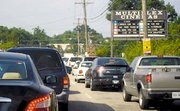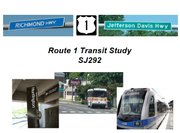Beacon of Groveton under construction. Photo by Michael Lee Pope.
This summer, residents in Mount Vernon will welcome a new Costco to the Richmond Highway corridor — a big-box retailer with a huge parking lot that will exemplify the kind of suburban and exurban development that has dominated far-flung reaches of the metropolitan region. Yet, at the same time, it will be celebrating a new mixed-use, transit-friendly development known as Beacon of Groveton about a mile away.
The two models of development — urban versus rural — are now fighting for dominance in Mount Vernon, where a transit study is about to determine which mode of transportation should prevail along the corridor. The options are bus-rapid transit, light rail or Metro — a menu that will have drastic consequences for the size and scale of development that happens in the coming decades.
"For a long time, people have thought that reality on the highway is we are going to build heavy rail like Metro down the corridor," said Lee District Supervisor Jeff McKay. "My hope is that this puts this to bed and says there are other ways to invest in transit on the highway that don't detonate a community and don't turn it into Tysons Corner."
The debate about Metro may seem like a distant dream, but it's actually a pressing concern now because developers want to know what kind of development is possible on the corridor. If high-density and mixed-use development is on the agenda because Metro is the goal, developers will be eager to come forward with large-scale projects to meet that demand. If, however, a smaller-scale corridor is on the horizon with bus-rapid transit, Richmond Highway will see more big-box stores and strip malls.
"I'm sure that decades ago in Tysons Corner they felt it was the same thing when it was all a bunch of farms," said Kahan Dhillon, businessman in Mount Vernon. "The corridor has one of the highest traffic counts of any road of its kind in the county, and there's no reason why a place like that should not be modernized and enhanced and revitalized."
THE CLASH between urban versus suburban and exurban development will last for at least another generation, as drivers continue to dominate the landscape for much of Route 1 — a highway that stretches from Key West to Maine. Despite attempts to create an urban core to the Mount Vernon area, drivers are likely to flock to the new Costco when it opens. Developers know people in the region are heavily reliant on their automobiles.
"Those folks still need to get in their cars and drive places," said Edythe Frankel Kelleher, executive director of the Southeast Fairfax Development Corporation. "And when they get in their cars, they want to go to a Costco. They want to have that big, one-stop shopping."
And yet that's a status quo that many find frustrating, especially those who would like to see a transformation of development styles to high-density and mixed-use styles. For these people the opening of the Costco represents a lost opportunity — one that will now create a sense of incongruity along the corridor.
"It is not consistent with what we have at the Beacon," said Mount Vernon District Supervisor Gerry Hyland. "If we had our druthers, we would prefer to have similar type developments to the Beacon."
“It’s not a pipe dream.”
— Del. Scott Surovell (D-44) on expanding the Yellow Line down Richmond Highway
ONE VISION of the future includes an expanded Yellow Line, moving south beyond Huntington along Richmond Highway through Mount Vernon. That may seem like a distant dream to some right now, considering the money and politics caught up in building the Silver Line to Dulles International Airport. But Del. Scott Surovell (D-44) has been pushing the issue of expanding the Yellow Line for years.
“It’s not a pipe dream,” said Surovell. “This is prime real estate, and if it had proper infrastructure serving it we would have the same kind of development as Arlington and Alexandria and Tysons Corner.”
Surovell says that the Richmond Highway corridor offers a perfect storm for Metro expansion. Commercial real estate in Cameron Run leases for $5 more per square foot than in Tysons Corner, an indication that demand can support increased development. Whereas the Silver Line is 20 miles long, extending the Yellow Line to Fort Belvoir would only require about eight miles of track. And because of the recent expansion at the fort, more people work there than the Pentagon. There’s even a collapsible wall at the Huntington station.
"I don't think people understand what it costs, and what the impacts of building heavy rail are," said McKay. "We need to stop tying up redevelopment projects and stop giving people, in my opinion, a false sense that we are going to have heavy rail on Route 1 in our lifetime."
THIS WEEK, officials with the Virginia Department of Rail and Public Transportation will select a vendor to conduct the $2 million transit study — a long-awaited venture along the corridor. Some see the study as a turning point, finally determining whether Richmond Highway will be a urban oasis or an exurban strip. Although the road has been the focus of countless studies in the past, many are looking to the results of this study to make a final determination on what the character of the future will hold.
“It makes much more sense to extend a Metro line here than it does to extend it way out into the suburbs like the Silver Line did,” said Surovell. “But we don’t have the infrastructure, and that’s why we need to extend it.”



